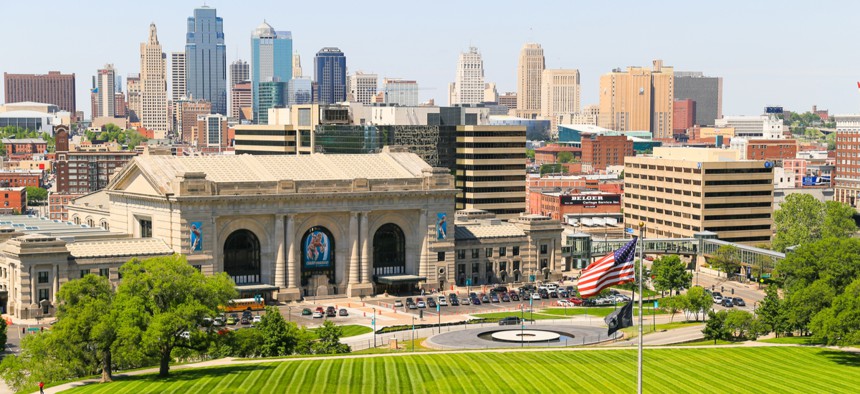Missouri Mayors Look to Expand High-Speed Internet Access

Kansas City, Missouri Shutterstock
“It’s becoming quite obvious that if you’re not connected, you’re falling behind,” Kansas City Mayor Sly James said.
When it comes to getting residents connected to high-speed internet, Mayor Sly James of Kansas City, Missouri is not anticipating that the federal government will swoop in anytime soon to solve the problems that his city and other localities in the Show-Me State are facing.
“I’m not holding my breath,” he said by phone on Friday, when asked about how lawmakers in Washington, D.C. could help cities in Missouri to improve internet connectivity. He’s similarly skeptical that the state government will provide much assistance.
But James and other local leaders in Missouri are taking some action of their own on this front.
Earlier this week, he and 16 other mayors gathered at the Kansas City Public Library for the Missouri Mayors Digital Inclusion Summit, where they heard from experts and discussed ideas about how to get more people in the state connected to the internet.
Kansas City is somewhat unusual in this area in that it is one of the cities in the U.S. where Google Fiber offers its ultra-fast gigabit-speed internet service. But, even so, James pointed out that there are parts of town where it’s not uncommon for residents to lack internet access at home.
This can be because people can’t afford it, he said, or because they just don’t see it as a priority.
“A lot of it has to do with poverty and income levels,” the mayor noted. “Internet is not the number one thing on the hierarchy of need.”
James, like others, sees this as problematic, especially for households with children, who often need reliable internet service to complete homework and other school assignments.
“Just because you’re poor doesn’t mean you shouldn’t have access to information,” he said. “It’s becoming quite obvious that if you’re not connected, you’re falling behind.”
The mayor described how Kansas City has launched programs to provide low-cost refurbished computers to residents, along with offering digital literacy programs to help address this issue.
For some of the smaller communities whose mayors attended this week’s summit, increasing internet connectivity may involve other types of solutions. James said one of the themes he picked up on at the summit was that electric utility cooperatives might provide promising opportunities to expand broadband or cellular service outside of major metropolitan areas.
These cooperatives are typically nonprofit, tax-exempt power suppliers, which are owned by their customers—the people who use the electricity the cooperative provides.
According to the National Rural Electric Cooperative Association, this structure for supplying electricity in the U.S. has roots in the 1930s, an era when nine out of 10 rural homes were without electric service and the federal government made a push to electrify rural regions.
The Association of Missouri Electric Cooperatives counts 47 electric “co-ops” among its statewide membership.
James suggested there could be ways for the federal government to use its buying power and regulatory influence to boost internet connectivity in rural communities.
“This infrastructure is as important as concrete, mortar and sidewalks and curbs,” he said. “This is how information is disseminated. This is how services are acquired.” He added: “The things we need to do aren’t political. They’re practical.”
Bill Lucia is a Senior Reporter for Government Executive’s Route Fifty and is based in Washington, D.C.
NEXT STORY: Kansas signs on for statewide drone traffic management






